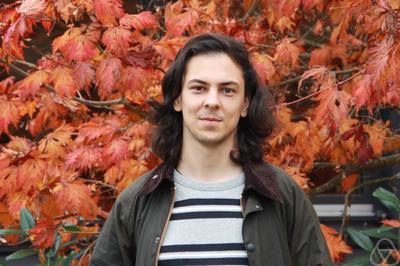
By Meaghan Thurston
Maksym Radziwill, an Assistant Professor in McGill’s Department of Mathematics and Statistics, has been awarded the prestigious Sloan Research Fellowship. Radziwill is considered one of the emerging research leaders among a new generation of analytic number theorists.
Open to scholars in eight scientific and technical fields – chemistry, computer science, economics, mathematics, computational and evolutionary molecular biology, neuroscience, ocean sciences, and physics – the Sloan Research Fellowships are awarded in close coordination with the scientific community. Candidates are nominated by their fellow scientists and winning fellows are selected by independent panels of senior scholars on the basis of each candidate’s independent research accomplishments, creativity, and potential to become a leader in his or her field.
With 30 publications to his name, Radziwill is emerging as a research leader in probabilistic number theory, the theory of the Riemann zeta function, and of L-functions, as well as the theory of modular forms and elliptic curves. He graduated with an undergraduate degree from McGill in 2009, and completed his PhD in 2013 at Stanford University. He was a Visiting Member at the Institute for Advanced Study from 2013-14. From 2014-2017 he was the Hill Assistant Professor at Rutgers University. Radziwill returned to McGill as an assistant professor in 2016.
The Fellowship is the second research boost in as many months for Radziwill. In December 2016, Radziwill was honoured together with Professor Kaisa Matomäki of the University of Turku, Finland, as the joint recipient of the $10,000 SASTRA-Ramanujan Prize for their ‘revolutionary’ and collaborative work on multiplicative functions in short intervals. This joint-research has been celebrated for unlocking a series of breakthroughs in number theory, one example of which was the unexpected resolution of Erdös discrepancy problem – a mathematical puzzle proposed by Hungarian mathematician Paul Erdős in the 1930s. Radziwill’s research has also helped unmask the correlations between near neighbors in a multiplicative sequence.
“I am thrilled that the Alfred P. Sloan Foundation is supporting Prof. Radziwill’s cutting-edge and collaborative research in number theory, which has the potential to provide solutions to the world’s most significant unresolved mathematical problems,” said Rosie Goldstein, VP Research and Innovation. “McGill is proud to be able to support Radziwill’s work at this important stage in his research career.”
The Foundation website states that “Sloan Research Fellows, once chosen, are free to pursue whatever lines of inquiry are of the most compelling interest to them. Their Sloan funds can be applied to a wide variety of uses for which other, more restricted funds such as research project grants cannot usually be employed. Former Fellows report that this flexibility often gives the Fellowships a value well beyond their dollar amounts.”
Past Sloan Research Fellows include many towering scientific figures, including physicists Richard Feynman and Murray Gell-Mann, and game theorist John Nash. Forty-three former fellows have received a Nobel Prize in their respective field, 16 have won the Fields Medal in mathematics, 69 have received the National Medal of Science, and 16 have won the John Bates Clark Medal in economics, including every winner since 2007. Get more information on the achievements of former Sloan Research Fellows.
Read the complete list of winners.
